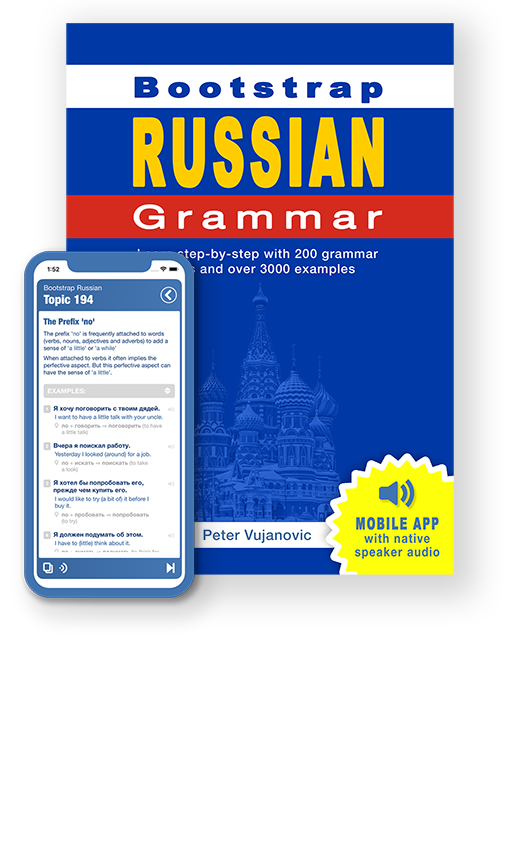Russian grammar - The reflexive personal pronoun себя |
|||
|
|||
Recall that in reflexive verbs the «-ся» is a contraction of себя (oneself). себя can also be used independently. It declines only according to case as follows: • себе (prepositional), себя (accusative), себя (genitive), себе (dative), собой/собою (instrumental) The verb чувствовать / почувствовать (to feel) is a common verb that takes себя as a direct object. |
| Examples: | |
|
Виктор не уверен в себе.
Victor is unsure of himself.
|
|
|
Расскажите нам о себе.
Tell (formal) us about yourself.
|
|
|
Они не могут позаботиться о себе.
They can't take care of themselves.
|
|
|
Сейчас я чувствую себя хорошо.
I am feeling fine now.
|
|
|
Но утром я чувствовал себя плохо.
But in the morning, I (male) was feeling bad.
|
|
|
Она написала письмо себе.
She wrote a letter to herself.
|
|
|
Отец купил себе ружьё.
My father bought himself a rifle.
|
|
|
Я приглашу его к себе.
I will invite him over to my place.
|
|
|
Отец иногда брал меня к себе в кабинет.
Father sometimes took me to his office.
|
|
|
Мне как-то не по себе.
I don’t feel quite myself.
|
|
|
Он сделал это для себя.
He did that for himself.
|
|
|
Он кладёт все инструменты около себя.
He puts all the tools beside him.
|
|
|
Они будут у себя в комнате.
They will be in their room.
|
|
|
Я положил книгу рядом с собой.
I (male) put the book close to myself.
|
|
|
Если вы пойдёте в кино, возьмите с собой сестру.
If you (formal) go to the movies, take your sister with you.
|
|
|
Закрой за собой дверь.
Close the door after you.
|
|
|
У тебя с собой много денег?
Do you (informal) have a lot of money with you?
|
|
|
Пожалуйста, возьми меня с собой!
Please take me with you!
|
|
|
Татьяна положила сумку рядом с собой.
Tatiana put the bag next to her.
|
|
|
Он будет доволен собой.
He will be pleased with himself.
|
|
 |
|




